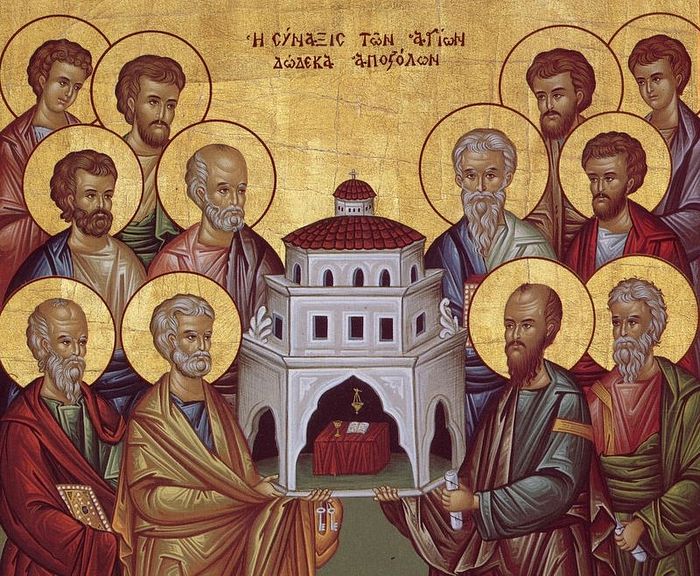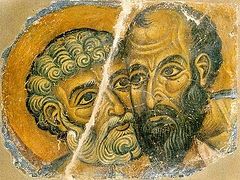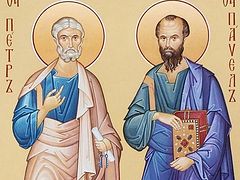 Photo: pravoslavnaya-biblioteka.ru
Photo: pravoslavnaya-biblioteka.ru
But when Cephas came to Antioch I opposed him to his face, because he stood condemned. . . . But when I saw that they were not straightforward about the truth of the gospel, I said to Cephas before them all, “If you, though a Jew, live like a Gentile and not like a Jew, how can you compel the Gentiles to live like Jews?” (Galatians 2:11-14)
And count the forbearance of our Lord as salvation. So also our beloved brother Paul wrote to you according to the wisdom given him, speaking of this as he does in all his letters. There are some things in them hard to understand, which the ignorant and unstable twist to their own destruction, as they do the other scriptures. (2 Peter 3:15-16)
It is clear in the Gospel that Jesus prayed for unity among believers – a oneness in the Church:
“I do not pray for these only, but also for those who believe in me through their word, that they may all be one; even as thou, Father, art in me, and I in thee, that they also may be in us, so that the world may believe that thou hast sent me. The glory which thou hast given me I have given to them, that they may be one even as we are one, I in them and thou in me, that they may become perfectly one, so that the world may know that thou hast sent me and hast loved them even as thou hast loved me.” (John 17:20-23)
What is the unity for which Christ prayed? What was He thinking about when He asked that we all be one? Did He imagine the Church would be a monolith? Did He imagine we would be like the collective, hive-mind Borg in the sci-fi franchise Star Trek? Any reading of the New Testament shows us from the beginning of the Christian Church there was diversity, debate and disagreement. There are four versions of the Gospel which do not agree in every detail. The Church rejected the effort to eliminate the differences in the text and preserved all four versions of the Gospel. The Twelve were quickly confronted with the outsider Paul, called by Christ to leadership but not from within the fellowship of the Apostles. Paul and Peter disagreed on issues. There was the unexpected growth of Christian communities following the persecution of the Church and a variety of Christian experiences in which, according to the Acts of the Apostles, the Apostles are chasing after the Holy Spirit rather than leading the mission of the Church (see my The Acts of the Apostles and Evangelism). Then the rise of heresies and a multitude of voices and the Apostles sorting through all the claims to establish legitimacy for Christianity and a recognized message and theology.
Modern historians tend to think that the Church did not start off with uniformity and conformity and then move to diversity. Rather, they think Christianity diversified right from the get-go, and only later as the Church came into its own in the imperial Church does the leadership begin attempting to demand more conformity and uniformity in the Church. Church Councils and canon law attempted to reign in on the diversity and bring about expressing the common mind of the Church in a more uniform manner.
Jesus Himself did not send out the Apostles alone into the world, but rather sent them out in pairs, where team work would require the two to have a common mind about what they taught and did. It meant that oneness of mind had to be worked on and established.
After this the Lord appointed seventy others, and sent them on ahead of him, two by two, into every town and place where he himself was about to come. (Luke 10:1 )
The Apostles themselves had to interpret the parables and teachings and commandments of Christ. They had to decide how to live the Gospel, and what behaviors, attitudes and ideas were outside the bounds of the Gospel commandments. This is why St Paul tells us we have to work out our salvation – we have to talk with one another, listen to each other and come to a common mind. This has to be worked on and worked out, it doesn’t happen by magic:
So if there is any encouragement in Christ, any incentive of love, any participation in the Spirit, any affection and sympathy, complete my joy by being of the same mind, having the same love, being in full accord and of one mind. (Philippians 2:1-2)
Oneness of mind occurs because we choose to love one another and we choose to make it happen.
The Apostles had to apply the commandments of Christ to new and diverse situations, they had to apply a Gospel teaching to issues which Christ had not Himself addressed. They needed wisdom to understand when new thinking was required of them in order to remain faithful to the spirit of the Gospel. We can see for example how St Paul emphasized certain teachings of Jesus and downplayed others:
“A few examples are enough to demonstrate this: e.g., Jesus summoned his followers to leave everything; Paul admonished them to remain in the social role in which they had been called (1 Cor 7:27-28). Jesus promised toll collectors and prostitutes that they would enter the kingdom of God before the pious (Mt 21:32); Paul excluded prostitutes from the kingdom of God (1 Cor 6:9). Jesus commanded his disciples to dispense with earning a living and having possessions (Mt 10:9; 6:25ff. par); Paul is proud of earning his own living—and recommends that his communities should also do the same (1 Thess 2:9; 4:11). Paul orientates his ethical instructions on the needs of the local communities; by contrast the ethic of Jesus is … an ‘itinerant radicalism.’” (Petros Vassiliadis, “From the Pauline Collection to Phos Hilaron of Cappadocia”, SVTQVol 56 #1 2012, p 8)
The Apostles not only had to interpret the teachings of Christ, they also had to interpret their own experiences in the light of the Gospel – their successes as well as their failures, their victories as well as their suffering.
“In relating his sufferings to those of Christ (Philippians 1:29) and stating that he desires to share in Christ’s sufferings (3:10), Paul interprets the pain of his fetters as capable of transforming death into life, of revealing Christ’s identity (cf 1:20), and ultimately of glorifying God. Paul, like Christ, suffers so that life may come and so that God may be glorified.” (L. Ann Jervis, AT THE HEART OF THE GOSPEL, p 57)
As we celebrate the glorious, triumphant leaders of the Holy Apostles Peter and Paul, we can appreciate the diversity of the Church through its long history. The Apostles allowed differences in practice or teaching because they believed the Gospel was still preserved in this. They blessed new communities and a variety of experiences that occurred by the prompting of the Holy Spirit but beyond their control.
While Peter was still saying this, the Holy Spirit fell on all who heard the word. And the believers from among the circumcised who came with Peter were amazed, because the gift of the Holy Spirit had been poured out even on the Gentiles. For they heard them speaking in tongues and extolling God. Then Peter declared, “Can any one forbid water for baptizing these people who have received the Holy Spirit just as we have?” And he commanded them to be baptized in the name of Jesus Christ. Then they asked him to remain for some days. (Acts 10:44-48)
The unity of the Church was not the result of the Church being a monolith. The interior unity of the Church was found in Christ,despite the multiplicity of experiences and expressions. The unity of the Church is Christ, the Holy Spirit, the Holy Trinity, love. Because the Church is made up of many diverse peoples with divergent spiritual experiences, it has always had to wrestle with of what its unity consists and how to maintain that oneness that Christ prayed for. Councils, canons, creeds all were established to help maintain the unity which recognizing the reality of the diversity of peoples and spiritual gifts. The unity of the Church relies on our willingness to love one another and to cooperate with the Holy Spirit and to accept the Lordship of Jesus Christ.
Blessed Saints Peter and Paul
pray to God to help us be one
even as the Father and the Son are one.




We have "One Faith, one Church and One Baptism". That Church is the very Body of Christ extended in time, a living organism that operates in unity and proper conduct, as specified by the 14 General Councils (not just the 7 we call "Ecumenical"); the Writings of the Fathers; and the Tradition of the Apostles as refined by the Holy Spirit over centuries.
Fr T: "The unity of the Church relies on our willingness to love one another and to cooperate with the Holy Spirit and to accept the Lordship of Jesus Christ."
This sentimentalist pap could have come from the "Statement of Faith" of modern Evangelical Protestant "Gospel" Church.
Your first "job" is to "Love the Lord your God with all you heart, and with all your soul, and with all your mind, and all your strength". St Mark12:30-31. And you can only do that within Traditional Orthodoxy, with its standard practices, worship, beliefs, and structures: again it is the Body of Christ, and NOTHNG ELSE IS.
After that, as a second commandment: "You shall love you neighbor as yourself". Here, "love" is agape, which is care and concern to help others around you who may be in dire need. It is NOT a warm, fuzzy, cuddly feeling. In fact, it is not a "feeling" at all: It is an action.
============================